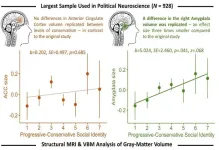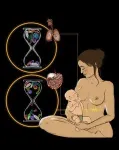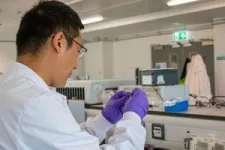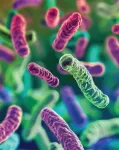(Press-News.org) Conservative voters have slightly larger amygdalas than progressive voters—by about the size of a sesame seed. In a replication study publishing September 19 in the Cell Press journal iScience, researchers revisited the idea that progressive and conservative voters have identifiable differences in brain morphology, but with a 10x larger and more diverse sample size than the original study. Their results confirmed that the size of a person’s amygdala is associated with their political views but failed to find a consistent association between politics and the anterior cingulate cortex (ACC). Anatomical differences in both the amygdala and ACC varied depending on a person’s economic and social ideology—which aren’t necessarily aligned—indicating that relationships between political ideology and brain structure are nuanced and multidimensional.
“It was really a surprise that we replicated the amygdala finding,” says first author and political psychology and neuroscience researcher Diamantis Petropoulos Petalas (@diamond_petalas) of The American College of Greece and member of the @HotPoliticsLab at the University of Amsterdam. “Quite honestly, we did not expect to replicate any of these findings.”
The new study, which aimed to replicate a widely shared 2011 study that was based on 90 UK university students, used pre-existing MRI brain scans from 928 individuals aged 19-26 whose levels of education and political identities were representative of the Dutch population. Because the Netherlands has a multi-party political system, the study was also able to compare brain structures along the continuum from left- to rightwing, in contrast to the two-party UK system. In addition, the researchers looked at the participants’ “ideology” from various angles, including their political identity and stance on socioeconomic issues, which allowed them to compare brain structures along different dimensions of progressivism and conservativism.
The researchers paired the brain data with a questionnaire about the participants’ politics, which included questions about their social and economic identity (e.g., how they view themselves on a sliding scale of progressive to conservative, and which political party they identify with), and questions pertaining to their social and economic ideology (e.g., where they stand on different social and economic issues, such as women’s and LGBQT rights, income inequality, and profit sharing).
“We see ideology as a complex, multidimensional product; that includes different attitudes on social and economic matters, as well as identification with progressive or conservative ideals; it’s really not just about the left or the right,” says Petropoulos.
In agreement with the original study, the researchers found an association between conservatism and the volume of gray matter in the amygdala; however, this association was three times weaker compared to the original study.
“The amygdala controls for the perception and the understanding of threats and risk uncertainty, so it makes a lot of sense that individuals who are more sensitive towards these issues have higher needs for security, which is something that typically aligns with more conservative ideas in politics,” says Petropoulos.
The association between amygdala size and conservatism also depended on the political party that the individual identified with—for example, participants who identified with the socialist party, which has radically left-wing economic policies but more conservative social values, had on average more gray matter in the amygdala compared to other progressive parties.
“The Netherlands has a multi-party system, with different parties representing a spectrum of ideologies, and we find a very nice positive correlation between the parties’ political ideology and the amygdala size of that person,” says Petropoulos. “That speaks to the idea that we're not talking about a dichotomous representation of ideology in the brain, such as Republicans versus Democrats as in the US, but we see a more fine-grained spectrum of how political ideology can be reflected in the brain’s anatomy.”
However, in contrast to the original study, the team did not find any association between conservatism and a smaller volume of gray matter in the ACC, a brain region involved in error detection, impulse control, and emotional regulation.
The researchers also extended their analysis to examine potential associations between political identity and other regions of the brain. This analysis uncovered a positive association between the gray matter volume in the right fusiform gyrus, a region in the temporal lobe that is essential for visual and cognitive functions, and economic and social conservatism.
“These regions have to do with facial recognition, so it makes sense that they might be involved when one is thinking about political issues, because political issues often remind us of the political personas that represent ideology on those issues,” says Petropoulos. “Just the memory of the face of a politician, for instance, might make the fusiform gyrus light up a little.”
The MRI scans used in this study provide information only on the anatomy of different brain regions, but the researchers say that future work should integrate information about the functional connections between the amygdala and different parts of the brain.
“I think the future of this endeavor to identify political orientations in the brain will be to look more towards functional connectivity network and neural synchrony studies—how brain networks organize and synchronize between individuals, and whether there are differences in this synchronization when individuals with difference political ideologies consume similar content,” says Petropoulos.
###
The authors declare no competing interests.
iScience, Petropoulos Petalas et al., “Is Political Ideology Correlated with Brain Structure? A Preregistered Replication” https://www.cell.com/iscience/fulltext/S2589-0042(24)01757-7
iScience (@iScience_CP) is an open-access journal from Cell Press that provides a platform for original research and interdisciplinary thinking in the life, physical, and earth sciences. The primary criterion for publication in iScience is a significant contribution to a relevant field combined with robust results and underlying methodology. Visit http://www.cell.com/iscience. To receive Cell Press media alerts, contact press@cell.com.
END
A new international collaborative study provides a list of the wildlife species present at the market from which SARS-CoV-2, the virus responsible for the COVID-19 pandemic, most likely arose in late 2019. The study is based on a new analysis of metatranscriptomic data released by the Chinese Center for Disease Control and Prevention (CDC). The data come from more than 800 samples collected in and around the Huanan Seafood Wholesale market beginning on January 1, 2020, and from viral genomes reported from early COVID-19 patients. The research appears September 19 in the journal Cell.
“This is one of the most ...
Human breast milk regulates a baby’s mix of microbes, or microbiome, during the infant’s first year of life. This in turn lowers the child’s risk of developing asthma, a new study shows.
Led by researchers at NYU Langone Health and the University of Manitoba, the study results showed that breastfeeding beyond three months supports the gradual maturation of the microbiome in the infant’s digestive system and nasal cavity, the upper part of the respiratory tract. Conversely, stopping breastfeeding earlier than three months disrupts the paced development of the microbiome and ...
The GENOXPHOS (Functional Genetics of the Oxidative Phosphorylation System) group at the Centro Nacional de Investigaciones Cardiovasculares (CNIC) has discovered a crucial role of sodium in the generation of cellular energy. The study, led by GENOPHOS group leader Dr. José Antonio Enríquez, also involved the participation of scientists from the Complutense University of Madrid, the Biomedical Research Institute at Hospital Doce de Octubre, the David Geffen School of Medicine at UCLA, and the Spanish research networks on frailty and healthy aging (CIBERFES) ...
Researchers at Cranfield University have developed an innovative new method for identifying biomarkers in wastewater using origami-paper sensors, enabling the tracking of infectious diseases using the camera in a mobile phone. The new test device is low-cost and fast and could dramatically change how public health measures are directed in any future pandemics.
Wastewater a key way to track infections
Testing wastewater is one of the primary ways to assess the prevalence of infectious diseases in populations. Researchers take samples from various ...
About The Study: In this large cohort study of successive pregnancies, influenza vaccination was not associated with increased risk of adverse perinatal outcomes, irrespective of interpregnancy interval and vaccine type. Findings support recommendations to vaccinate pregnant people or those who might be pregnant during the influenza season.
Corresponding Author: To contact the corresponding author, Darios Getahun, MD, PhD, MPH, email darios.t.getahun@kp.org.
To access the embargoed study: Visit our For The Media website at this link https://media.jamanetwork.com/
(doi:10.1001/jamanetworkopen.2024.34857)
Editor’s ...
About The Study: The findings of this study suggest that optimizing body mass index (BMI) in women and men from the preconception period onward might be an important strategy to improve fertility and reduce the risk of miscarriage.
Corresponding Author: To contact the corresponding author, Vincent W. V. Jaddoe, MD, PhD, email v.jaddoe@erasmusmc.nl.
To access the embargoed study: Visit our For The Media website at this link https://media.jamanetwork.com/
(doi:10.1001/jamanetworkopen.2024.36157)
Editor’s Note: Please see the article for additional information, including other authors, author contributions and affiliations, conflict ...
A new international study provides a shortlist of the wildlife species present at the market from which SARS-CoV-2, the virus responsible for the COVID-19 pandemic, most likely arose in late 2019.
The study, published Thursday in the journal Cell, is based on an analysis of genetic data released by the Chinese Center for Disease Control and Prevention. The data comes from more than 800 samples collected in and around the Huanan Seafood Wholesale market in Wuhan, China, beginning on Jan. 1, 2020, and from viral genomes from early COVID-19 patients.
"This may be the last big, new set of data directly from ...
LOS ANGELES — A team of researchers from City of Hope®, one of the largest and most advanced cancer research and treatment organizations in the U.S., and The University of Texas M.D. Anderson Cancer Center, have reported safety and efficacy results from a Phase 1 trial that featured a personalized vaccine to treat lymphoplasmacytic lymphoma, a rare and slow-growing type of blood cancer, according to a study published recently in Nature Communications.
The current approach to lymphoplasmacytic lymphoma care is active surveillance of a patient’s possible symptoms. ...
Climate change is forcing people to adapt to changing environmental conditions. But what really makes the difference is how they do it. The recently published Hamburg Climate Futures Outlook 2024 by 73 authors shows that, in the long run, only sustainable adaptation can succeed. This global assessment by University of Hamburg’s Cluster of Excellence Climate, Climatic Change, and Society (CLICCS) also provides practical recommendations.
“Successfully adapting to the impacts of climate change is just as difficult and challenging as reducing emissions of every kind,” says Anita Engels, Professor of Sociology ...
Carnegie Mellon University Africa announced today that the African Engineering and Technology Network (Afretec) has signed its eighth university partner, Al Akhawayn University. The network, launched in 2022, provides a vehicle for technology-focused universities in Africa to engage in deep collaboration to drive inclusive digital growth, create technology development and job growth, and shape policy change.
Afretec Network members span the entire continent and include Carnegie Mellon University Africa, the American University in Cairo, Université Cheikh ...








